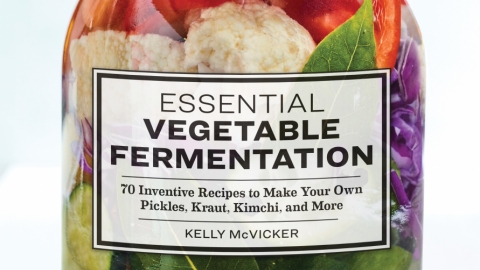Ingredients
- 5 unwaxed lemons
- 1/4 cup kosher salt
- 2 bay leaves
- 1 cinnamon stick
- 1 tsp whole coriander seeds
- 1/2 tsp whole black peppercorns, optional
- 2 small dry-roasted chilies
- 2 sprigs fresh rosemary
- 2 sprigs fresh thyme
- 3 to 4 cloves garlic, peeled and lightly crushed
- 1 tsp each toasted cumin seed and fennel seed
Instructions
Preserved Lemons
By Kelly McVicker, private recipe collection
1. Prepare a pint jar and lid by washing with hot soapy water, or sterilizing in boiling water for 1 minute. Keep in mind that thoroughly cleaning all jars, utensils and tools is paramount in any fermentation project to avoid unhealthy bacteria growth.
2. Wash lemons in warm water, scrubbing well to remove dirt. Dry well with paper towels. Cut a thin (⅛ inch) slice off the stem end of 3 lemons, then cut them into wedges (4–6 per lemon).
3. Juice the remaining 2 lemons, for about ¼–½ cup juice
4. Toss lemon wedges with salt in a large bowl. Fill each jar halfway with lemon wedges, pressing down as you go. Slip bay leaves, cinnamon stick and chili (if using) against the sides of the jar, add coriander seeds and peppercorns. Repeat with remaining wedges. Top with any leftover salt that remains in the bowl.
5. Fill the jar with lemon juice to cover lemons, leaving ½ inch headroom at top of jar. You may need to juice more lemons and add more juice as needed. Place the lid on the jar, and screw the band down until tight.
6. Place the jar in a dark, cool place for 2 weeks. Give it a shake every day to redistribute the salt. Periodically check that lemons are fully submerged under the brine. Use a clean utensil to adjust if necessary. After 2 weeks, lemons are ready to use.
Troubleshooting: Don’t despair if all of the lemon wedges do not fit in the jar. Depending on lemon size the wedges from 3 lemons may not fit completely into your jar.
Using Preserved Lemons
To turn your preserved lemons into lemon paste, remove the seeds and purée the lemons along with their juice in a blender until they form a smooth, creamy paste. You can then add this paste to salad dressings, rice, couscous or anything that would benefit from a bright citrus punch. Store in the refrigerator for up to a year.



